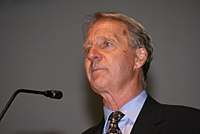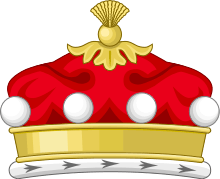David Verney, 21st Baron Willoughby de Broke
Leopold David Verney, 21st Baron Willoughby de Broke DL FRSA FRGS (born 14 September 1938) is a British member of the House of Lords.[1]
The Lord Willoughby de Broke DL FRSA FRGS | |
|---|---|
 | |
| Member of the House of Lords Lord Temporal | |
| Assumed office 9 July 1986 Hereditary peerage | |
| Preceded by | The 20th Baron Willoughby de Broke |
| Personal details | |
| Born | Leopold David Verney 14 September 1938 |
| Political party | Non-affiliated |
| Other political affiliations | UKIP (2007–2018) Conservative (until 2007) |
| Alma mater | New College, Oxford |
Early life
Leopold David Verney was born on 14 September 1938. The only son of John Verney, 20th Baron Willoughby de Broke and Rachel Wrey, Verney was educated at Le Rosey in Switzerland and at New College, Oxford where he studied modern languages (BA, then Oxbridge MA).[2]
Career
He inherited his father's title in 1986[3] and is one of the 90 hereditary peers elected to remain in the House of Lords after the passing of the House of Lords Act 1999; originally elected a Conservative peer, he defected to the UK Independence Party (UKIP) in January 2007,[4] making him one of only four UKIP members at Westminster.
Since 1992, he has been Chairman of the St Martin's Theatre Company Ltd.[5] - the building of the St Martin's Theatre was commissioned by his grandfather. From 1999 to 2004, he was President of the Heart of England Tourist Board.[6]
From 1990 to 2004, Willoughby de Broke was Patron of the Warwickshire Association of Boys' Clubs[7] and from 2005 to the present has been Chairman of the Warwickshire Hunt.[8] Since 2002 he has been a governor of the Royal Shakespeare Theatre and also since 2002 the president of the Warwickshire branch of the Campaign to Protect Rural England. He is a Fellow of the Royal Society of Arts (FRSA) and of the Royal Geographical Society (FRGS).
On 19 November 2009, Willoughby de Broke introduced the Constitutional Reform Bill 2009-10 into the House of Lords, with clauses to repeal the European Communities Act 1972 and the Human Rights Act 1998, to reduce the powers of the House of Commons and government, to reduce MPs' pay, and to give more power to local authorities.[9]
On 29 May 2012, Willoughby de Broke introduced the Referendum (European Union) Bill 2012–13 to the House of Lords, to make provision for the holding of a referendum on the United Kingdom's continued membership of the European Union, on the same day as the next General Election.[10][11]
He left UKIP in the autumn of 2018.[12]
Personal life
He married Petra Aird, the daughter of Colonel Sir John Renton Aird, Bart., in 1965. They divorced in 1989, and in 2003 he married secondly Alexandra du Luart, only daughter of Sir Adam Butler and a granddaughter of one-time Deputy Prime Minister Rab Butler. He has two sons by his first marriage, Rupert and John Verney, and two stepdaughters.
The heir apparent to the title is his elder son, the Hon Rupert Greville Verney (born 1966).
References
- UKIP: People: Peers
- The New College Register 2001
- www.peerage.com
- UKIP members in the House of Lords Archived 2012-03-21 at the Wayback Machine UKIP Central and South Derbyshire Branch
- "Lord Willoughby de Broke" Archived 2013-01-03 at the Wayback Machine, UK Parliament. Retrieved 2012-12-10.
- www.tourismalliance.com
- www.wayc.org.uk
- www.warwickshirehunt.co.uk
- "Constitutional Reform Bill 2009-10". Archived from the original on 2010-01-28. Retrieved 2010-04-08.
- "Referendum (European Union) Bill 2012-13 - UK Parliament". Archived from the original on 2012-10-17.
- "Referendum (European Union) Bill (HL Bill 28)".
- "Lord Willoughby de Broke". UK Parliament. Retrieved 2018-12-04.
External links
- www.dodonline.co.uk
- www.cracroftspeerage.co.uk
- Debrett's People of Today
- paternal ancestry
- maternal ancestry
- thepeerage.com
| Peerage of England | ||
|---|---|---|
| Preceded by John Verney |
Baron Willoughby de Broke 1986–present |
Incumbent |
